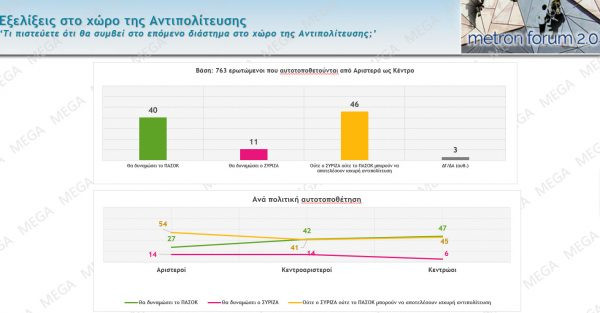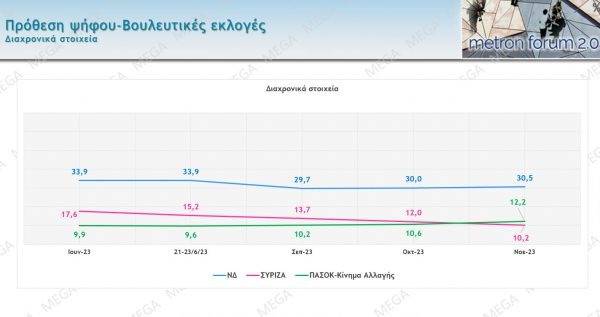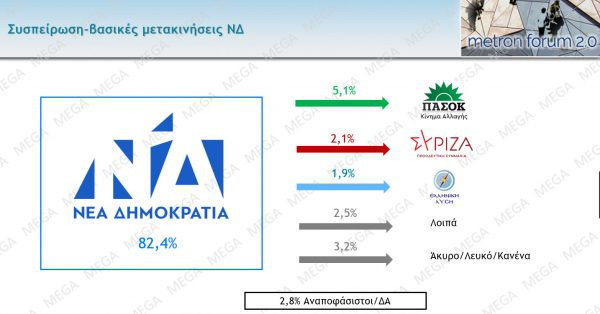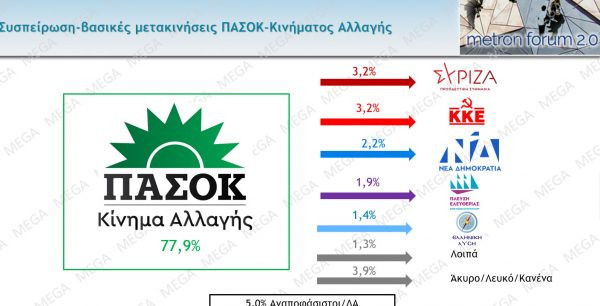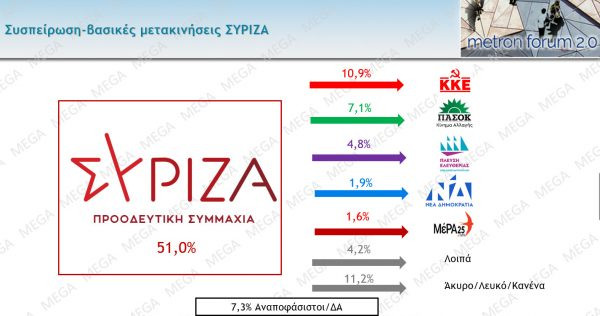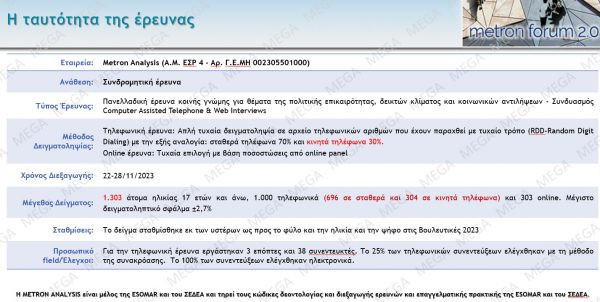SYRIZA after the split and the departure of top and historical executives shortly before the creation of a new distinct K.O. registers a loss of almost two points while it shows that PASOK is strengthening.
A first impression of the political climate and electoral correlations, immediately after the split of SYRIZA, is captured by the Metron Forum 2.0 survey, by the Metron Analysis company, for MEGA.
The research shows that the government is counting electoral losses, at least at the polling level, from the events of the last months, the fires, the floods, the problems in the reaction of the state apparatus, but also from the increase in accuracy although it maintains strong forces.
SYRIZA after the split and the departure of top and historical executives shortly before the creation of a new distinct K.O. registers a loss of almost two points while it shows that PASOK is strengthening.
SYRIZA marginally above single-digit percentages
The losses for SYRIZA continue and compared to October, the official opposition party loses an additional 1.8% and reaches 10.2% in the voting intention. PASOK gains 1.6% compared to October and reaches 12.2% and is recorded as the second force according to opinion polls. ND also recorded a gain of 0.5%, reaching 30.5%.
The results show a further electoral retreat and record the state of crisis in the official opposition, but the majority (46%) estimates that neither PASOK nor SYRIZA can form a strong opposition. It is found, however, that 4 out of 10 center-leftists believe that PASOK will get stronger.
The rapid decline of SYRIZA and the gradual rise of PASOK are clearly recorded in the longitudinal data of METRON Analysis’s voting intention since June.
The leaks of SYRIZA
According to the poll, half of the voters (51%) of SYRIZA in the June elections remain united in the party. The largest movements from SYRIZA are recorded towards the KKE and less towards PASOK.
ND records the highest rally, over 80%.
PASOK also recorded a high rally.
The status of the new leader does not yet bring increased popularity to Stefanos Kasselakis.
Kyriakos Mitsotakis, despite the cost of major natural disasters, remains the most popular politician with 45% positive opinions against 53% negative, while the general secretary of the Central Committee of the KKE Dimitris Koutsoubas is also particularly popular, with 40% positive opinions and 50% negative.
Nikos Androulakis has 37% positive opinions and 54% negative, while Zoe Konstantopoulou also has 35% positive and 58% negative.
On the contrary, Stefanos Kasselakis has only 31% positive opinions, with negative ones reaching 54%.
The percentage of Stefanos Kasselakis is considered particularly low – even taking into account the parameter that he is a man unknown to the general public until recently – if we see that traditionally newly elected party leaders tend to have particularly high popularity ratings. For example, Alexis Tsipras had 65% in March 2008, Kyriakos Mitsotakis 58% in January 2016 and Nikos Androulakis 55% in December 2021.
Losses for the ND – Kasselakis does not yet reverse the downward trend of SYRIZA
In relation to the intention to vote, the poll shows that the climate of pessimism and dissatisfaction with the economy and with the response to natural disasters is also reflected in polls, with the ND falling 4.2% compared to the previous poll (29.7 % versus 33.9%).
However, SYRIZA did not fare particularly well either, as it dropped from 15.2% to 13.7%. On the contrary, PASOK rises to 10.6% from 9.6% and KKE from 6.5% goes to 6.5%.
Because the research was done before and after the election of Stefanos Kasselakis, Metron Analysis presents the discrepancies before and after. SYRIZA appears barely strengthened, much less compared to the ND or the KKE, a fact that confirms that the problems in the appeal of the official opposition remain active.
ND maintains a higher rally at 82%, PASOK is also relatively high with 79%, while the rally at 74% is indicative of SYRIZA’s problems. It is interesting that SYRIZA has the biggest “leaks” towards the KKE, followed by the Hellenic Solution and Freedom Sailing.
All this is also reflected in how Metron Analysis’s vote estimate is formed. According to this, the ND falls more than 4% to 36.4%, an element that records a real political cost. However, it does not seem to benefit SYRIZA, which is also falling by 1%. On the contrary, PASOK and KKE are being strengthened, and in the wider spectrum of the Far Right, the Greek solution.
The question concerning the limits of electoral influence is also interesting, because there it seems that SYRIZA as a party that voters could vote for (and respectively would never vote for it) seems to have smaller limits of influence not only than the ND but also PASOK.
Mitsotakis supremacy is maintained
In the spontaneous answers about who is more suitable for prime minister and who best guarantees the smooth functioning of the institutions, Kyriakos Mitsotakis maintains a clear lead. However, it is interesting that the percentage of “none” responses is also particularly high.
A transitional moment
It is clear that the survey summarizes dynamics that we will see in the next period as well, such as the increased dissatisfaction with the economy and the effectiveness of government work, which has already affected the electoral influence of the ND.
At the same time, however, it also captures the limbic moment for SYRIZA, which is going through all the shocks of the change of leadership and the end of the “Tsipras era”, with the combination between a sense of crisis and the emergence of a new and still essentially unknown for the society leader not being able to stop the electoral retreat.
This generates gains for other opposition parties, such as PASOK and the KKE, but it does not yet create possibilities for a more comprehensive reversal of the correlations of the June elections.
Source: Skai
I have worked in the news industry for over 10 years. I have been an author at News Bulletin 247 for the past 2 years. I mostly cover politics news. I am a highly experienced and respected journalist. I have won numerous awards for my work.


